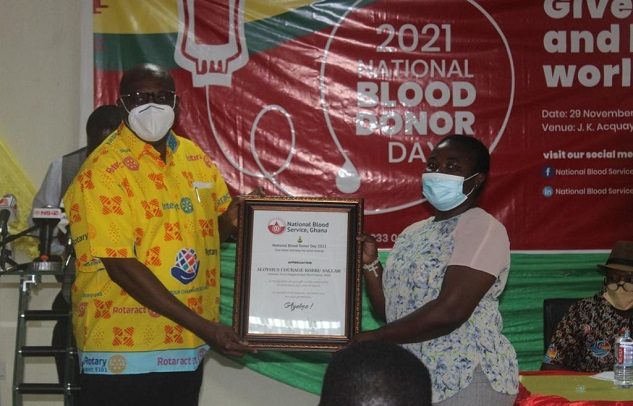An award winner receiving a citation.
The National Blood Service (NBS) lacks the needed funding to scale up and sustain its operations, Chief Executive Officer (CEO) Dr. Justina Kordai Ansah has said.
According to Dr. Ansah, the NBS runs a small annual budget relative to the growing demand for blood and blood products for transfusion hence limiting its ability to adequately meet the demand for safe blood in health facilities.
“The National Blood Service requires sufficient budget for expansion and long-term sustainability of blood service across the country,” she said.
Dr. Ansah was speaking at the 21st National Blood Donor Day celebration jointly organized by the Rotary Clubs of Accra, Accra -Ridge, and Accra Airport on the theme, “Safe Blood Saves Lives” and the Slogan “Give Blood and Keep the World Beating.”
She said the blood service through its blood centers directly supply blood and blood components to over 90 health facilities and four Zipline distribution centers which provide emergency supplies to health facilities in hard-to-reach communities.
The CEO of the NBS observed that the national voluntary blood donation declined from 34 percent of total donation in 2019 to 17 percent in 2020.
Over the same period, the percentage of voluntary blood donations collected by the three blood centres; Accra, Kumasi and Tamale, recorded a decline from 52 per cent in 2019 to 24 per cent in 2020.
“Of course the steep decline was mainly due to the impact of the Covid-19 pandemic,” she explained.
Dr. Ansah further indicated that the country has a youthful population that needs to be encouraged to voluntarily donate blood to shore up the dwindling numbers.
“With the youth constituting 38.2 percent of the population, it is safe to conclude that many more Ghanaians qualify, in terms of age, to give blood bearing in mind the eligible age for blood donation of 17 to 60 years,” she added.
President, Rotary Club of Accra, Frank Gadzekpo, said to maintain an adequate blood supply, approximately one to three percent of the population needed to become blood donors.
“We certainly have a big shortfall in collection. The gap between what we collect and what is needed cannot be bridged by family-based donations only,” he said.
Mr. Gadzekpo, therefore, emphasized the need for the country to move towards 100 percent voluntary blood donation and called on the government, policymakers, health workers, and the public to put their efforts together to meet the target.
Organizations and individuals who have contributed to voluntary blood donation in the country were rewarded at the event.
By Jamila Akweley Okertchiri


